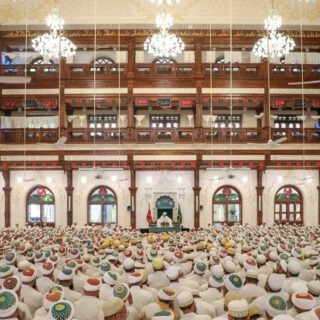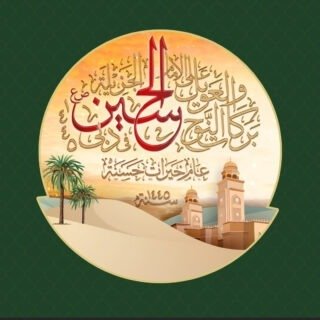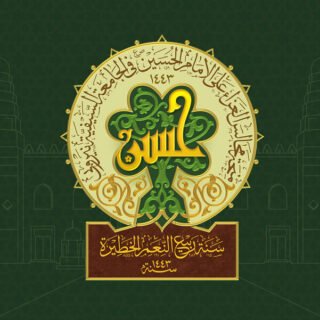My brother, know that the characteristics and dispositions of people vary due to four reasons. Firstly, due to the humors in their bodies and their constitution. Secondly, due to the soil and air of their towns and cities. Thirdly, because of their upbringing in accordance with the faiths and values of their forefathers, teachers, tutors and all those who may have overseen their upbringing and nurturing. Fourthly, due to the influence of the stars at the time of their conception and early development. This final aspect is the root cause, while the rest branch out from it. We are required to further explain this matter so that the truth of our words and the reality of our statements become apparent. We shall begin with the outcomes and consequences that arise due to the humors in the body, and because of changes in their constitution: from a state of balance to an increase or decrease in their quantities, and how this leads to various, and contrasting characters and traits.
A Chapter on the Variation in Characteristics Caused by Humors
My brother, know that the majority of those having a ‘hot’ disposition, especially when it comes to the temperament of the heart, are courageous and resilient, munificent, they remain undaunted even in the face of the most fearsome of circumstances. They are spontaneous, often acting on impulse, swift in their actions, intense in their anger, quick to reconcile, free from bearing grudges, astute and intelligent, incisive and perceptive. Likewise, the majority of those with a ‘cold’ temperament are obtuse, thick skinned, lethargic and crude in character. While the majority of those possessing a ‘wet’ disposition are listless, indecisive, affable, munificent, refined in character, acceptive, quick to forget and extravagant in their worldly matters. Finally, the majority of those having a ‘dry’ temperament patiently carry out their tasks, are resolute to the extent of becoming obstinate, with the traits of patience, bearing grudges, miserliness, parsimony and preservation of the existing state of matters dominating their personalities.
A Chapter on the Creation of Adam Nabi AS, as narrated in one of the books of Bani Israel
One of the texts of Bani Israel details the creation of Adam Nabi and the formation of his body. When Allah, the Almighty, created Adam Nabi and gave him form, He stated: “I have created Adam and have formed his body from four elements. I have also ensured that these four elements remain in his children and descendants, constituting their bodies and its development till the Day of Qiyaamat. I have formed his body from the wet, the dry, the hot and the cold. For I have created him from sand and water, then I have infused in him soul and spirit. The dry element of his body is due to the sand, why the moist element comes from the water. Its heat stems from the soul, while the spirit is the source of its coolness.
Further to these four elements, I have placed additional constituents which bring together the various aspects of the body, without which it would cease to function. Each of these constituents requires the others so that it may discharge its function. These constituents include black bile, yellow bile, blood and phlegm. I then placed one in another: aridity in black bile, heat in yellow bile, moistness in blood and coolness in phlegm. Whenever a body maintains a balance between these four elements which I made the source of its existence and sustenance, without any variations, increase or decrease, in their proportions, it will be in perfect health and its form will be ideal. However, were an element to increase in proportion to the others or end up subsuming the others, then this will lead to illness entering the body, its severity determined by the extent of this excessiveness. Further, if the proportion of an element were to decrease then it would not have the ability to resist the other elements resulting in them overpowering it eventually leading the body to succumb to illness, its severity determined by the decrease in the proportion of that element and the extent of its inability to resist them.
I then taught him medicine, and the science of medication; how it leads to an increase where there is inadequacy and results in a decrease where there is excessiveness until a balance is reached and the body is fit and healthy. A good doctor, one well versed in ailment and its treatment, is one who is able to identify whether an illness plaguing a body is caused by an increase or decrease in the four elements and then determine the treatment to be administered, thus removing deficiency and eliminating excessiveness, until the body regains its health and returns to its natural state, and a state of balance is achieved by the coming together of these elements.
I then ensured that these humors from which I formed the body would become the very basis and principles upon which the characters of the children of Adam would develop, and by which they would become known. From sand comes resolve, from water there is leniency and gentleness, heat yields anger while coolness is the source of deliberation. However, if the proportion of aridity were to increase then resolve would transcend into harshness and hardheartedness. Likewise, if moisture were to increase then gentleness would give way to apathy and complacency. Similarly, if the proportion of heat were to increase anger would descend into fury and scurrility. Finally, if the amount of cold were to exceed the normal then deliberation would turn to tardiness and indolence. Thus, if a balance is struck and all the elements are in equal proportions a person will be of moderate character and righteous behavior: resolute in his deliberateness, gentle in his resolve, composed in his gentleness, careful in anger. One characteristic will not dominate the others, no element of his humors will be disproportionate or in a state of imbalance. If he wishes he can further develop or seek to limit any characteristic, as he sees fit.
I then infused him with my spirit, and combined with his body a soul and spirit. It is through his soul that the son of Adam hears, sees, smells, tastes, touches, perceives, eats, drinks, sleeps, sits, laughs, cries, feels happy and grieves. It is through his spirit that he understands, comprehends, attains awareness, learns, develops a sense of shame and forbearance, senses fear, proceeds, prevents, shows kindness, desists from and carries out [an action]. From the soul stems anger, recklessness, desires, frivolity, pastimes, risibility, foolishness, deceit, craftiness, vehemence and maladroitness. From the spirit he derives forbearance, dignity, morality, sense of shame, elegance, intellect, kindness, perceptiveness, truthfulness, skill and patience.
If a man of understanding were to ever sense that a trait belonging to the characteristics of the soul is beginning to dominate his personality then he should counter it with its opposite from amongst the characteristics of the spirit. By adhering to this trait, he should seek to restore balance and rectify the disproportion. Anger should be countered through gentleness, recklessness with dignity, desires by morality, frivolity with a sense of shame, drollery through elegance, risibility with grief, foolishness through kindness, deceit with courage, falsehood through truth, vehemence through skill, testiness with patience, maladroitness with deliberateness; for every illness is treated through its opposite.
From the earth component originates his harshness, miserliness, brusqueness, avarice, despondency, despair, resolve and stubbornness. Likewise, water is the source of his gentleness, mildness, freedom from inhibitions, benevolence, kindness, munificence, strength, closeness, acceptance, aspirations and optimism. If a man of understanding were ever to sense a concern that a characteristic of earthly origin was dominating his personality then he should seek to counter it with its opposite character of aquatic origin. He should adhere to this diametric trait and seek to restore balance and rectify the disproportion. His harshness is to be countered with gentleness, miserliness with benevolence, brusqueness with cheerfulness, avarice with kindness, despondency with aspirations, despair with optimism, resolve with acceptance and stubbornness with justice.”
My brother, know that for each characteristic from amongst these traits there are characteristics sharing similar tendencies, as well as ones which are in stark contrast to them. Each of these characteristics expresses itself in varying and differing ways, which requires further clarification so that they become clear and understandable, for this realm of knowledge and understanding is a noble and lofty one. It is through this knowledge that one understands the characteristics possessed by the honorable amongst the children of Adam and by the divine beings who reside in the heavens, who are described by Allah Ta´ala as “honourable writers”, “honourable and benevolent”. It is also through this discipline that one learns of the traits and characteristics of satanic beings, the people of hellfire, as mentioned by Allah Ta´ala “Whenever a group of people enter (hellfire) they curse their fellow beings”, “they state: they are not welcome, they are to burn in hellfire”.
Now that our words have established the various factors that influence the character of man from the perspective of the four humors, we now wish to discuss the manner in which variations in the terra firma of places and changes in their atmospheric conditions lead to differences in character.








